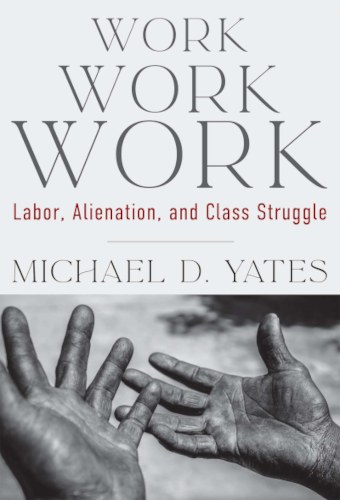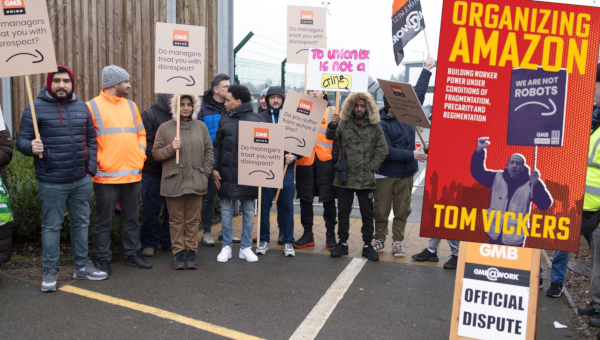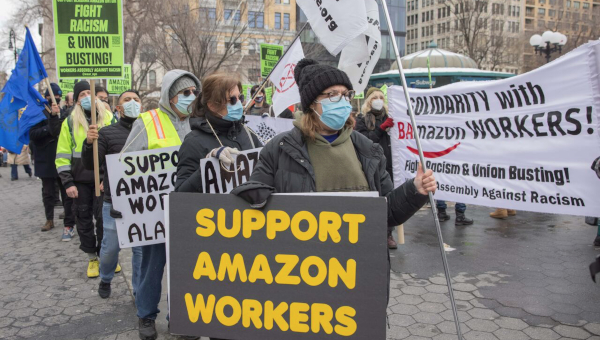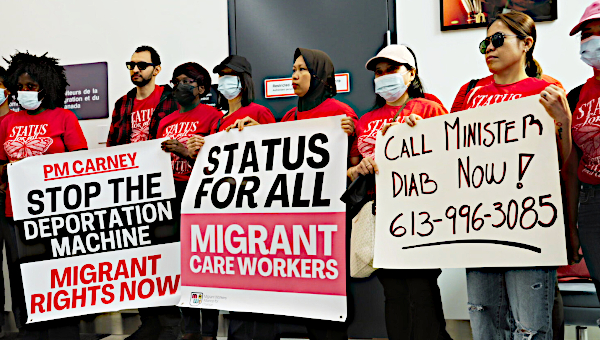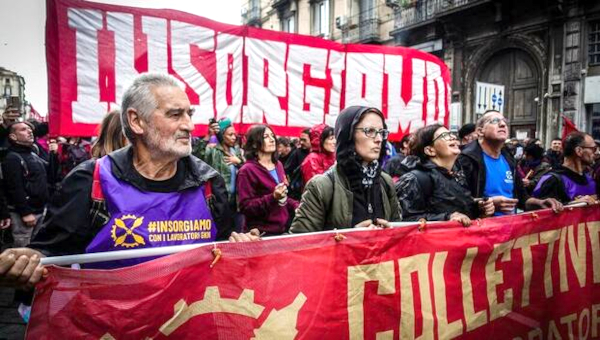‘To Liberate Ourselves, We Must Reinvent Work’: Class Struggle, Workplaces, and the State
Mike Yates is a long-time Marxist and socialist writer and analyst, one of the editors of Monthly Review. Over the years he has written extensively about capitalism, with particular emphasis on the working class, its life, potential, and role in transforming society. His latest book, Work Work Work: Labor, Alienation, and Class Struggle, gathers a series of his re-edited essays and articles dealing with various aspects of work, the working class, its institutions, its contradictions and potentials, and the broader social relations that drive them.
Yates’s main preoccupation is the following:
“[I]f we are ever to liberate ourselves, we must reinvent work. Whether we will convert the daily hell that is work today into something that connects us to other people and the world around us, or we will descend into the alienation engulfing us” [25].
The essays cover life in modern workplaces, the drudgery and danger of working in the context of capitalism, how work and the working class is perceived in mainstream bourgeois economics; contradictions and hierarchies within the working class, especially racism, patriarchy, and how they need to be addressed; the rise and tragic decline of an iconic US union; and perspectives on how to build a movement against work as we know it in capitalism as well as the system itself.
Capitalism and the Making the Working Class
Yates relies, for the most part, on his varied experience and grounding in Marxist political, economic, and social understanding. Against the past concentration of working-class studies on blue collar workers and the current preoccupation with the most precarious workers, this thoughtful collection incorporates a genuine cross section of the working class and all of its strata: blue and white collar, public and private sector, different levels of job security and labour market position, and those involved in social reproduction outside of direct participation in the labour market.
In the chapter “Panopticon,” Yates presents a concise and effective description and analysis of the historical and contemporary project of controlling and intensifying the work of workers. This takes us from the Benthamite monstrosity of the Panopticon, through the formation of factories, Taylor’s Scientific Management, and the development and application of the now-ubiquitous lean production model with its aggressive work intensification.
Yates addresses, as well, the nature of working-class resistance and the larger strategies that a movement to transform work and challenge capitalism might take. This ranges across the failure of social democracy; the nature of the current labour upsurge (and its limitations); the costs and solutions to the existence of racism and patriarchy within the working class; the lessons that can be learned from past and current struggles and social experimentation; and the critical importance of addressing climate change. He provides an excellent critique of unions today and insists on a radical critique of, and alternatives to, the current reliance on social democratic parties.
But while his analysis contains constructive ideas about how to evaluate the working-class movement today, it also contains questionable elements. These include his rather uncritical extolling of the potential of worker co-operatives and worker-owned business alternatives within capitalism. and his limited attention to the dilemma of democratizing and transforming the state. There is also a problematic assessment of ongoing struggles and experiments, and the reader will likely want to hear more about his thoughts on how a truly radical party might come into existence and how it might concretely contribute not just to policy but also to the development of working-class understandings, confidence, and individual and collective capacities.
His critique of social democracy speaks to the tendencies, put forward by dominant elements in the DSA, that see socialism (and socialist consciousness) as emerging through an accumulation of successful social democratic reforms. Aside from this being utopian and idealist, he sees each and every spontaneous struggle as being a “harbinger” of a socialist revolution in waiting – an approach that ultimately undermines the significance and actual potentials of these struggles.
Nevertheless, he quite convincingly calls for social democratic parties to be replaced by “democratic working-class parties” oriented to the elimination of the capitalist system as opposed to this accumulation of modest reforms. In making this case, he singles out the environmental costs of capitalism as well as the effects on the lives of the working class. Yates is clear that the pieces of the system are not separate or independent from the structures and underlying logic of the larger system, thereby making a wholesale transformation to socialism essential.
His rich reading of the union movement emphasizes that the current upsurge cannot be understood apart from the historical weaknesses and defeats of the labour movement and the working class as a whole during the neoliberal period. The legacy of that defeat has, Yates argues, left us with labour leaders that all too often collaborate with employers and capital as a whole, cozying up to right-wing and business-oriented politicians. Corrupt and undemocratic practices, hesitancy in challenging racism and patriarchy in its ranks, and refusing to take on work intensification and management power in the workplace – all these have, beyond the attacks from capital and the state, been central to the defeat of the working class and the decimation of the movement’s ranks. And, Yates emphatically argues, this calls for a radical transformation of unions or their replacement with other forms of collective organization.
While his perspective on the actual state of the union and workers’ movement is tempered by a sobriety rooted in a strong analysis, he muses about workers developing a different and radically different approach somehow emerging from the experience of the economic crisis, the COVID pandemic, and the struggles against police violence of previous summers. Citing Mike Davis, he writes, “A sense of rage is boiling over. For this rage to take a leftist and profoundly radical direction, masses of people will have to force the issue” [162].
Yates is most powerful when he focuses on the role of education, and in particular, socialist education in its fullest collective content, as indispensable to building working-class power, organization, and consciousness:
“Some of us can educate, explaining the world in which we live clearly and in language that does not look at the working class from the outside, examining and analyzing it, but as part of it, teaching while we learn in dialogue with others” [168].
Critical Issues and Questions
Three critical issues seem worth elaborating. They also invite other crucial discussions.
1. Worker Co-ops
Yates (and others) place great weight on the experience of worker-run businesses or co-ops. Yet they are not necessarily prefigurative of working-class institutions in a socialist society. They are, today, most often cut off from being part of a larger socialist political movement – in contrast to the German Social Democratic and Communist co-operatives in pre-WW2 Germany. Left to stand on their own, they might be important to provide necessary community services denied by racism or other failures of governments and big capital (as is the case in Jackson, Mississippi, and was the case in the 1960s with the various community clinics and spaces provided by the Panthers). But they don’t necessarily point the way forward for socialists or provide the kind of experiences that can necessarily teach participants how to work in a non-capitalist environment. Such enterprises are subject to the same forces of private market pressures of competition, profit-making, accumulation, and dependence on financial markets – all leading to pressures to cut costs and especially the cost of labour. They generally either fail, stagnate, or transform into ordinary capitalist enterprises.
Most importantly, they often are based on anarchist notions that the state can be ignored or surrounded and replaced by social institutions such as co-ops, and therefore, their advocates avoid teaching about the necessity of or the means to engaging and working to transform the state or challenge state power. They don’t, therefore, effectively raise alternative ways of organizing work or society. Instead, what is likely to be learned is how to survive as an enterprise in a highly competitive private market environment, or worse, that collective experimentation doesn’t work.
2. Key Struggles and Experiences
Participation in key political and social struggles, such as Black Lives Matter and Occupy (not to mention the Wisconsin rebellion, the various teachers’ strikes), is important for politicizing young and other working-class people and building resistance to the most egregious forms of capitalist inequalities and outrages. But what is missing in such discussion is whether and how participants and leaders in these movements develop inclinations to move on to the challenges of building for socialism.
Even some of the most exciting struggles don’t necessarily lead to movements or generation of leaders that can work to transform key state institutions with a longer-term socialist perspective. They can also generate the converse: a cohort of activists whose goal is individual upward social mobility, with aspirations to become integrated into the ruling class strata.
What is missing is a socialist politics and attendant education operating in some organized way in these kinds of movements. What may start as radical forms of resistance don’t inherently lead participants to identify capitalism as the problem and the need to replace it with a socialist society led by the working class (broadly defined). That can only be grasped through conscious education occurring alongside the experience of struggle and experimentation. Otherwise, the lessons spontaneously learned – and shaped through fragmented experiences, the framing of the mass media, and right-wing populism – are mixed and are as likely to lead to depoliticization, a turn to the right, or a fatalistic acceptance of individual survival and individual upward social mobility.
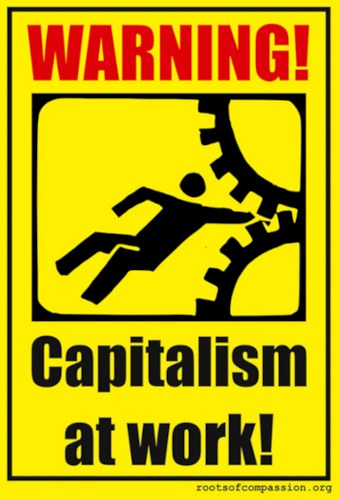
Where, then, will workers get to participate in these kinds of socialist educational experiences, and where will the educators – hopefully, as Yates implies, increasingly developing out of the working class – come from? What kinds of institutions need to be created in order to do this? Absent a socialist party (or parties), can this be accomplished in the interim – however imperfectly – through organized groups of socialists with an eye to the future formation of such a party?
3. Social Democracy and Party Building
Yates calls for social democratic parties to be replaced by “democratic working-class parties”. But his hopes for what might lead to the formation of such parties – a problem that has long stymied the left – remains unconvincing (and none of us on the left – certainly not I – can claim to have come close to solving it) The bottom-up experiences he cites either didn’t succeed or were developed in societies where radicals or socialists were already running the government. Experimental political initiatives such as workers’ assemblies and the Richmond Political Alliance could provide important spaces for building a radical, working-class political project – with allies – but there are few other such experiments. And even there, we know precious little about how the activists building these experiments are doing political education with workers about challenging capitalism and building toward a socialist future.
A coming together of various experimental local movements isn’t likely on its own to build a party. Without a highly organized core of socialists working to create a different political orientation inside and around them, the parties such movements have given birth to have, original intentions aside, drifted toward a social democratic in orientation.
In moving toward an eventual socialist party (or parties), it seems that the central task today is to develop capacities to do socialist education in working-class communities, institutions, and workplaces. And if this education is not to remain abstract to the participants, it must be inseparable from participation in critical struggles as socialists and others working together to develop socialist orientations in these struggles. It is this that provides the institutional foundation for radical working-class political activity, movement-building, class formation, and building the requisite socialist party/parties.
Work, Work, Work opens the door to a series of other questions not covered in the book. Should elections be the central fulcrum of socialist strategy, or should socialist parties refuse to participate in elections, like some on the far left maintain? What kind of relationship might there be between electoral participation and mass struggles to challenge capital, transform institutions, and experiment with alternatives ways organizing social life? In the US context, even if the Democratic Party can’t get us to socialism, might it provide a space to participate in primaries, or is it this an absolute dead end? Can we, even before getting to socialism, still work to transform and democratize the state? •


